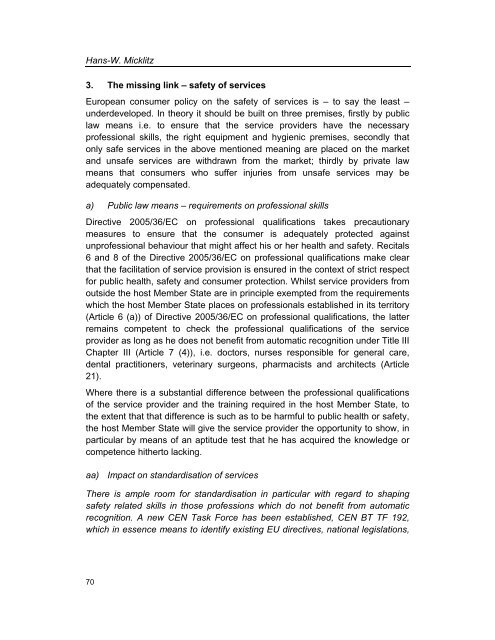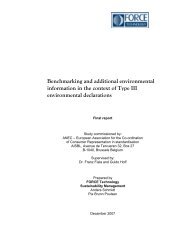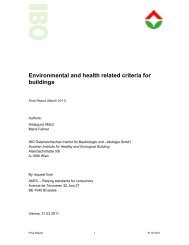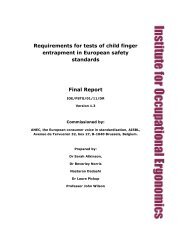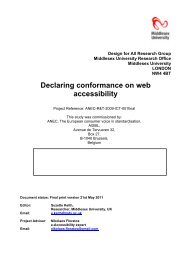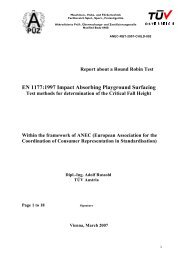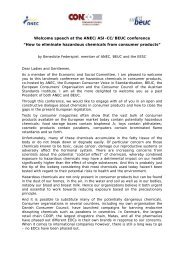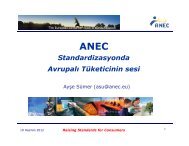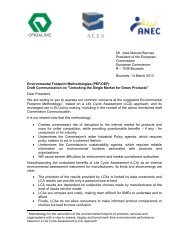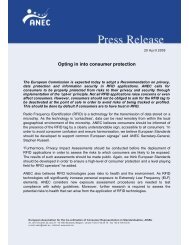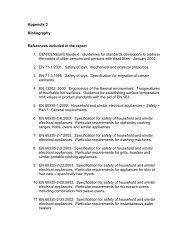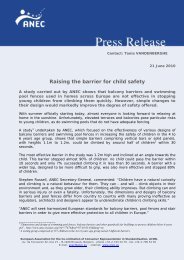Services Standards: Defining the Core Consumer Elements ... - ANEC
Services Standards: Defining the Core Consumer Elements ... - ANEC
Services Standards: Defining the Core Consumer Elements ... - ANEC
You also want an ePaper? Increase the reach of your titles
YUMPU automatically turns print PDFs into web optimized ePapers that Google loves.
Hans-W. Micklitz<br />
3. The missing link – safety of services<br />
European consumer policy on <strong>the</strong> safety of services is – to say <strong>the</strong> least –<br />
underdeveloped. In <strong>the</strong>ory it should be built on three premises, firstly by public<br />
law means i.e. to ensure that <strong>the</strong> service providers have <strong>the</strong> necessary<br />
professional skills, <strong>the</strong> right equipment and hygienic premises, secondly that<br />
only safe services in <strong>the</strong> above mentioned meaning are placed on <strong>the</strong> market<br />
and unsafe services are withdrawn from <strong>the</strong> market; thirdly by private law<br />
means that consumers who suffer injuries from unsafe services may be<br />
adequately compensated.<br />
a) Public law means – requirements on professional skills<br />
Directive 2005/36/EC on professional qualifications takes precautionary<br />
measures to ensure that <strong>the</strong> consumer is adequately protected against<br />
unprofessional behaviour that might affect his or her health and safety. Recitals<br />
6 and 8 of <strong>the</strong> Directive 2005/36/EC on professional qualifications make clear<br />
that <strong>the</strong> facilitation of service provision is ensured in <strong>the</strong> context of strict respect<br />
for public health, safety and consumer protection. Whilst service providers from<br />
outside <strong>the</strong> host Member State are in principle exempted from <strong>the</strong> requirements<br />
which <strong>the</strong> host Member State places on professionals established in its territory<br />
(Article 6 (a)) of Directive 2005/36/EC on professional qualifications, <strong>the</strong> latter<br />
remains competent to check <strong>the</strong> professional qualifications of <strong>the</strong> service<br />
provider as long as he does not benefit from automatic recognition under Title III<br />
Chapter III (Article 7 (4)), i.e. doctors, nurses responsible for general care,<br />
dental practitioners, veterinary surgeons, pharmacists and architects (Article<br />
21).<br />
Where <strong>the</strong>re is a substantial difference between <strong>the</strong> professional qualifications<br />
of <strong>the</strong> service provider and <strong>the</strong> training required in <strong>the</strong> host Member State, to<br />
<strong>the</strong> extent that that difference is such as to be harmful to public health or safety,<br />
<strong>the</strong> host Member State will give <strong>the</strong> service provider <strong>the</strong> opportunity to show, in<br />
particular by means of an aptitude test that he has acquired <strong>the</strong> knowledge or<br />
competence hi<strong>the</strong>rto lacking.<br />
aa) Impact on standardisation of services<br />
There is ample room for standardisation in particular with regard to shaping<br />
safety related skills in those professions which do not benefit from automatic<br />
recognition. A new CEN Task Force has been established, CEN BT TF 192,<br />
which in essence means to identify existing EU directives, national legislations,<br />
70


